With Digital Learning, a Global Pandemic, and an Isolating Quarantine, Students Are Feeling the Lack of Connection
“Coping with stress in a healthy way will make you, the people you care about, and your community stronger,” the Centers for Disease Control and Prevention said.
December 10, 2020
La Salle has not conducted in-person learning for almost nine months, and for students, it is taking a toll on mental health.
The Falconer spoke with six students, spanning across all four grades at La Salle, and when asked what they miss the most about in-person learning, each expressed a similar notion as senior Mattea Felder.
“The connection,” Felder said. “Not only with the teachers but also with classmates.”
Though sophomore Carson Frick said that he considers himself to be an introvert, he feels the same way. “I definitely just miss being around people,” Frick said. “You know it’s bad when the introverts are asking to be around groups of people.”
Sophomore Megan Snyder said that she misses school “a lot more than I thought I would… My friends mostly, but even just acquaintances at school, [and] just being around people.”
The physical distance that the coronavirus pandemic and the resulting quarantine requires is creating a disconnect between students. “Being in person gives me just comfort, in a way,” Felder said. “Being digital just kind of takes that away and it kind of is just an empty void.”
Junior Joe Demers expressed a similar sentiment. “When I’m talking to [friends virtually,] it’s like they’re super far away, and I can’t meet them face-to-face,” Demers said. “It just kind of sucks, to be honest… I just don’t really feel like, you know, with them.”
While some students had been trying to arrange socially-distanced meet-ups with friends before the recent freeze that was announced by Governor Kate Brown, this brought on new difficulties.
“When meeting friends it’s kind of hard,” Felder said. “You kind of have to remind yourself, ‘Okay, I can’t really get too close to them.’”
Frick said that with some family members who are at higher risk of serious illness should they contract the virus, meeting with friends is difficult, as “so many families have different rules,” he said.
Before the freeze, Snyder held a few socially-distanced picnics with her friends. “I think that was a really great way to see them because we were outside, and spending time together, but it was very safe,” she said.
However, because of the weather becoming colder, the picnics have come to a halt.
“Something I realized during this time is that I took spending time with friends for granted,” Snyder said. “I just didn’t realize how much they contributed to my everyday happiness, and I think that’s important to realize.”
The week before Thanksgiving break, La Salle chose to halt in-person activities. Before this, students could come on campus twice a week as long as they filled out a wellness form beforehand, signed in and out, remained socially distanced, and wore masks.
Recently, La Salle has allowed students to come on campus again, but now, with a new risk-level system put in place by the governor, indoor sports are prohibited for counties that are in the extreme risk category, as both Clackamas and Multnomah currently are.
Frick had previously been attending basketball workouts, but as of now cannot, “which sucks because that was a really good outlet to just go work out and see a bunch of people from school and some of my teammates.”
Senior Nicholas Slugg came on campus before Thanksgiving break to take a fitness test because he is applying to the Naval Academy. This was the only time Slugg came on campus, so “I haven’t really been able to keep in touch with other people there,” he said.
Snyder attended open hits for tennis, but she said that she didn’t come to campus often. “It works really well actually, because when you’re playing singles you’re on opposite sides of the court, and it’s just one of you, so yeah, it’s really safe that way.”
Felder, who picked up art supplies from La Salle a few times before Thanksgiving break, said that “it just felt very nostalgic” to go back on campus.
Felder described how the classrooms were emptied out, with desks pushed up against the walls and chairs removed.
“It was empty,” Felder said. “It just felt like all [of] the liveliness just got sucked out of it… It was just sad.”
To make up for the lost connection, some students have tried to arrange FaceTimes and Zoom sessions to chat with friends. However, this adds even more screen time than students are already experiencing with digital learning, which is “an excessive amount,” Frick said. “It’s a lot more than I would like.”
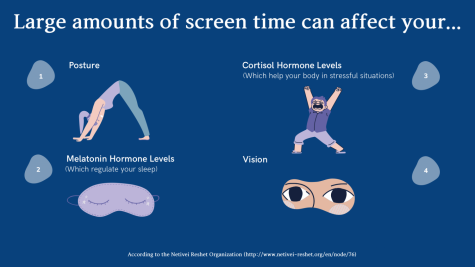
“There’s not a whole lot of options to go places and do things,” Frick said. “So sometimes I’ll end up just hanging around, either watching TV or playing Xbox or something like that.”
Slugg is experiencing a similar feeling. “Recently I’ve found myself spending a lot more time just kind of on the internet, because that’s really the only thing I really have because I’m not really talking to people all that much.”
Felder said that she wants to spend less time on the internet, but that “it is hard to kind of escape that… You’re just tired and you don’t really know what to do, and so you just kind of lie around and then look on your phone, and just watch videos.”
This lack of connection not only applies to relationships outside of school, but also during class.
“This year, I’ve definitely had some classes where I might not have had as many opportunities to, I guess, get stuff done and keep in touch with teachers,” Slugg said.
To help with this connection issue, some teachers have been giving students in-class time to chat through breakout rooms, and have encouraged students to keep their cameras on. But this hasn’t been working for everyone.
“It’s very hard for teachers to do anything, because it is so easy for kids to just sit back, mute, turn the camera off, [and] not really do anything, because, at the end of the day, it is school — so a lot of them just don’t want to do it,” Frick said. “And you’re kind of giving them a way out now because that’s just how it is, you’re in your own house.”
Felder likes to have her camera on, but she said that it depends on the class and on whether others have their cameras on as well.
Freshman Connor McQuillin said that having cameras on during class can be “awkward and embarrassing sometimes, because if you do something stupid the entire class can see that, including the teacher.”
“Also, I tend to eat my lunch a little later,” McQuillin said. “I don’t want people to see me eating… I think that’s kind of weird.”
As for breakout rooms, “it’s been kind of awkward,” Felder said. “It is definitely hard to kind of converse with each other… Sometimes people don’t really have their cameras on, and I’m sometimes that person, so it also just contributes to the feeling of not being in person together.”
To cope with the awkwardness, Felder has taken the opportunity to focus on her schoolwork. “I’m kind of just going along, doing online school, and just trying to keep myself busy,” Felder said.
But for some students, this can become exhausting, and some students are struggling to stay focused, especially considering the current stressful circumstances with the coronavirus pandemic.
According to the Centers for Disease Control and Prevention, stress during a pandemic can create difficulty sleeping or concentrating, which makes school even more difficult for students.
“I’ve had some days where I’ll just have back-to-back Zoom meetings for maybe a solid three hours in a row, and it can get really tiring, just because you’re staring at a screen that whole time,” Slugg said. “I think finding a way to do more flipped learning assignments, and maybe only being on the Zoom meetings for a maximum of 30 or 40 minutes, would really help.”
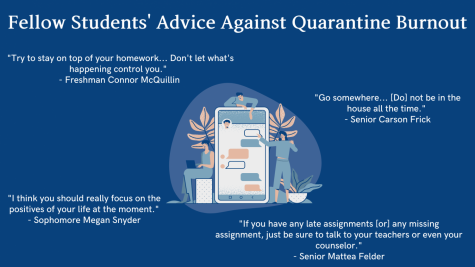
Along with the mental stress, using screens for schoolwork, homework, and then afterward for leisure time is giving students physical stress, such as eye strain issues, tense shoulders, and headaches.
“I usually have tension, and tension headaches, but it’s gotten a lot more pronounced for being on-screen for school,” Snyder said.
McQuillin said that he purchased blue light-blocking glasses, “because the eye strain was just too much… and they’re actually helping.”
Demers said that students are not only being affected socially, physically, and mentally by digital learning, but that schoolwork and grades are also being affected. “Being there in person would keep me a lot more focused, and it would actually motivate me to do my work,” he said.
With digital learning, some students are lacking this motivation. “It is a challenge to find motivation and not procrastinate and just be productive,” Felder said. “I definitely feel some sort of burnout.”
“I’m probably just drained, all the time, just physically tired,” Frick said. “I just feel so tired because it’s like I’m not doing anything, I’m just laying around all day anyway.”
Alongside the burnout, everything being digital is creating more distractions for students during class. “I’ll get distracted sometimes, I’ll go on my phone [and] I’ll start texting my friends just to see what they’re doing, I guess,” McQuillin said.
Demers is having a similar issue. “I probably get distracted by my phone or my iPad, because I can literally just turn off my camera and they can just not do anything about it,” he said.
Felder said that sometimes she can get all of her homework done in the afternoon, but that other times, “I just want to watch YouTube all day… [It’s] very unpredictable.”
For some students, since everything is digital, the homework load feels too heavy.
“It feels like so much homework because you are on Zoom… And then once that’s over, you just stay in the same place, and end up doing more homework after the Zooms are over,” Frick said. “So it all blends together and it almost just feels like it’s all homework, whereas normally we’d be at school doing that work, so it would feel separate, like a different thing.”
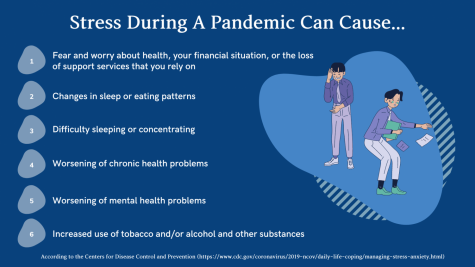
If McQuillin could ask one thing from teachers at La Salle, he said that he would ask for them to be more relaxed on homework.
Snyder agreed with McQuillin. “I think [the] school needs to keep in mind how much work is assigned,” she said. “My workload has been a lot, so I think that could really help with student stress and keep that in consideration.”
“I think it at least seems like more [schoolwork], just because [it’s] all being digital,” Snyder said. “Having it be digital makes people less motivated.”
However, for others, this is not the case.
“The homework load has been much more manageable than in person,” Felder said. She said that she thinks this is because of the modified schedule, having each class only twice a week with Wednesday being asynchronous. “I just think it gives me a bit more time to just do it on my own.”
“All my teachers have been very flexible with the assignments, and they are very understanding, so I really have no complaints,” Felder said. “[But] I just want to remind [teachers] that students have a lot of stuff going on, and even if they don’t have a lot of events, or just things going on in their life, a lot of stuff is happening mentally… “It can be very overwhelming if a lot of assignments are assigned.”
Wednesdays, which are asynchronous learning days, are especially unpredictable for students.
“I think the asynchronous days, some days are a blessing, and some days are kind of a curse, because some days I’m able to kind of get my work done early,” Slugg said. “But then again, there’s also the days that I procrastinate.”
Slugg’s advice against procrastination is to “go ahead and write down everything you have to do so you have it in front of you.”
But even with strategies like this for avoiding procrastination, some students are struggling to stay afloat amid the unreliability of COVID-19.
“I don’t think [COVID-19 has] really been stressful, it’s just been kind of upsetting,” Slugg said. “Because every single time you think that it’s going to get a little bit better, it just ends up getting worse.”
McQuillin agreed, pointing out that with the lack of routine in his life, “everything’s just random with what I do.”
Slugg said that while some days he is able to complete his work early, “it’s like there are days I wake up and I’m like, I’m not, no, I just don’t want to do this.”
Frick said that he is trying to take it day by day, but overall, “everything just feels kind of dull and the same.”
“At this point, I don’t even know,” he said. “It’s gone on for so long, and I don’t even know how to feel about it… [I’m] just burned out with the whole thing, but it doesn’t exactly seem like it’s coming to an end anytime super soon.”

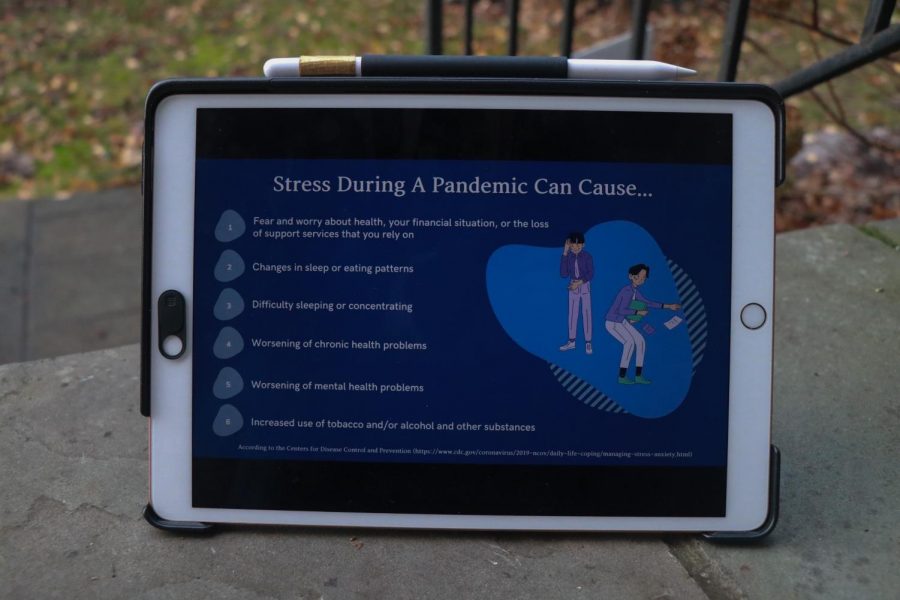
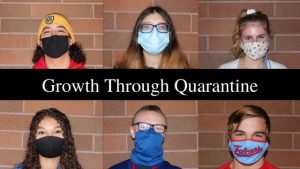

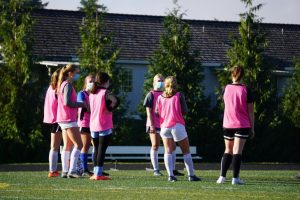
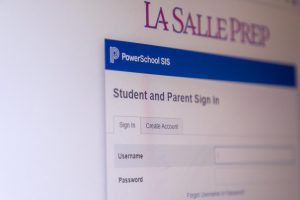
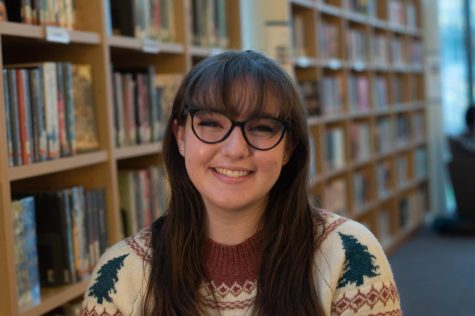



Kerri Kelvin • Dec 10, 2020 at 10:46 am
Fantastic article Brooklyn. Thank you.